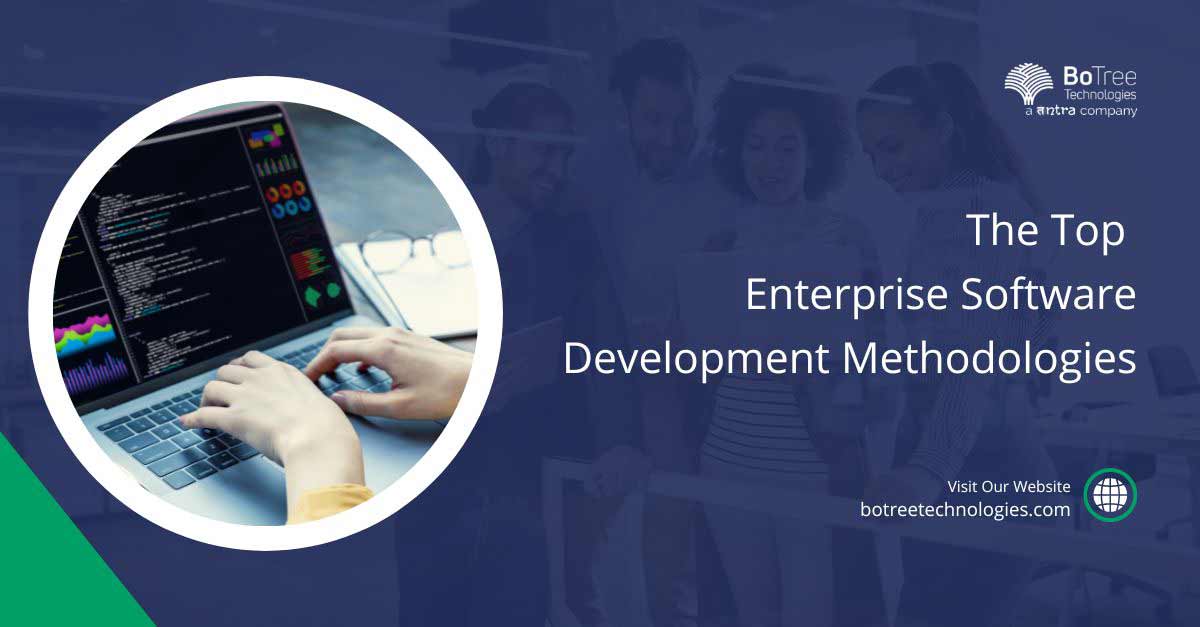Top Enterprise Software Development Methodologies

In the ever-evolving realm of software development, enterprises face the complex challenge of delivering high-quality solutions that align with business goals. Choosing a suitable development methodology can significantly influence the success of these projects. This blog delves into the top enterprise software development methodologies, highlighting their intricacies, benefits, and real-world applications. Whether your organization is a software development company or seeking enterprise software development services, understanding these methodologies is crucial for achieving optimal outcomes.
Waterfall Methodology: A Traditional Approach to Enterprise Software Development
The Waterfall methodology serves as the foundational framework for many software projects. In this sequential approach, each development phase – requirements, design, implementation, testing, deployment, and maintenance – follows a linear sequence. This method offers clear documentation and is ideal for projects with well-defined scope and minimal changes. However, its rigidity may hinder adaptability in fast-paced environments. Enterprises seeking precise planning and established timelines often find Waterfall suitable, especially when collaborating with software development companies for intricate projects.
Agile Methodology: Flexibility and Iteration at the Core
Agile methodology stands in stark contrast to Waterfall’s rigidity. Built on values of collaboration, flexibility, and rapid iteration, Agile breaks down projects into smaller, manageable sprint chunks. This approach promotes constant communication among cross-functional teams, ensuring continuous improvement and the ability to respond to evolving requirements. Enterprise software development services often embrace Agile for its ability to accommodate changes, enhance customer satisfaction, and foster teamwork. For software development companies, Agile empowers them to provide clients with incremental, functional releases.
Scrum Methodology: Navigating Complexity with Frameworks
Within the Agile universe, Scrum provides a structured framework for managing projects. It introduces roles like Scrum Master and Product Owner, artifacts like backlogs and user stories, and events like sprint planning and daily standups. Scrum’s emphasis on transparency, inspection, and adaptation fuels effective collaboration and accountability. Enterprises find value in Scrum’s ability to deliver working software quickly, adapt to evolving needs, and promote continuous feedback loops. Scrum ensures seamless communication, efficient task management, and timely deliverables for software product engineering services.
Kanban Methodology: Visualizing Workflow and Optimizing Efficiency
Kanban, another Agile offshoot, visualizes the workflow and optimizes efficiency. With a focus on limiting work in progress and managing flow, Kanban is particularly suitable for complex, dynamic projects. Enterprise software development services benefit from Kanban’s ability to identify bottlenecks, enhance resource allocation, and ensure smooth project progress. Software development companies embrace Kanban for its adaptability and real-time insight into project status, enabling effective decision-making.
DevOps Methodology: Bridging the Development-Operations Divide
In the age of rapid deployment, DevOps methodology emerges as a game-changer. DevOps breaks down silos between software development and operations teams, promoting collaboration, automation, and continuous integration and delivery. Enterprises seeking accelerated software deployment and enhanced cooperation across departments find DevOps indispensable. Software development companies utilize DevOps to ensure seamless code integration, efficient release cycles, and reliable software deployment.
Hybrid Methodologies: Customization for Optimal Outcomes
Recognizing that one size does not fit all, hybrid methodologies combine elements from different approaches to suit unique enterprise needs. Hybrid models like ScrumBan blends Scrum and Kanban principles, offering flexibility and structure. These adaptable approaches empower enterprises to balance predictability and adaptability, catering to diverse projects and goals.
Choosing the Right Methodology for Your Enterprise: A Strategic Decision
Selecting the appropriate methodology requires a thoughtful analysis of factors such as project scope, team size, industry, and timeline. It also entails evaluating the existing organizational culture and processes. For software development companies, this decision influences how they collaborate with clients and deliver successful solutions. Enterprise software development services providers leverage their expertise to guide enterprises through the methodology selection process, ensuring alignment with business objectives.
Conclusion:
Embracing Agile Evolution
In the dynamic landscape of enterprise software development, agility and adaptability reign supreme. The choice of a development methodology shapes how software development companies and enterprise software development services providers approach projects, collaborate with stakeholders, and deliver value. Waterfall, Agile, Scrum, Kanban, DevOps, and hybrid methodologies each offer distinct advantages, enabling enterprises to navigate the complexities of modern software development. By embracing the principles of these methodologies, organizations unlock the potential to innovate, optimize processes, and drive successful software projects in an ever-evolving digital era.
